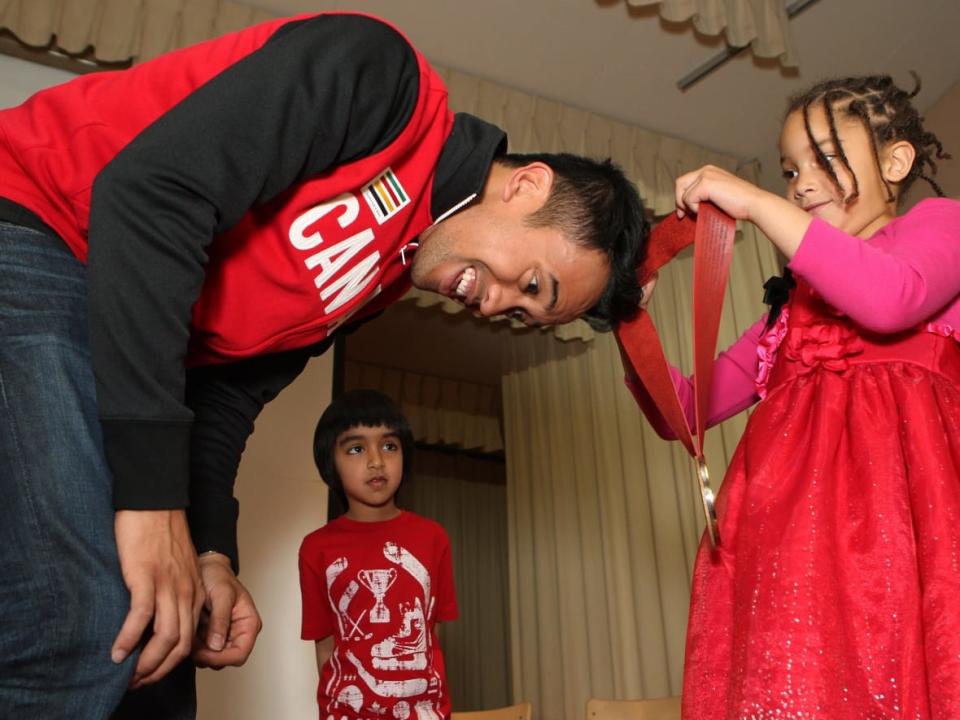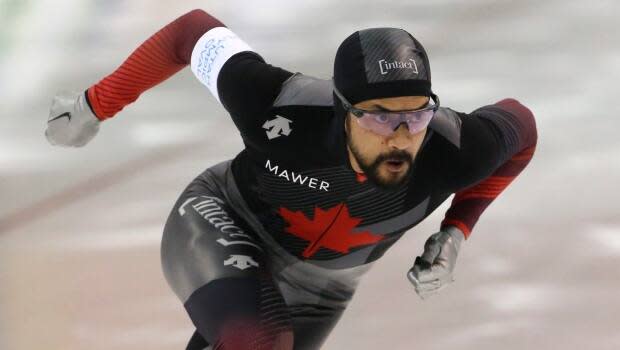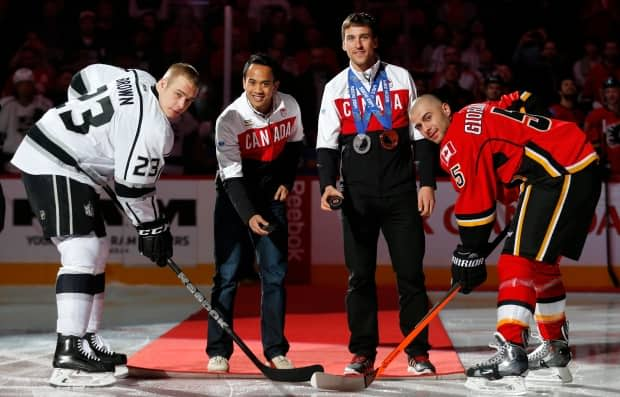Gilmore Junio wants speed skating career to be defined by more than personal success

As Gilmore Junio attempts to reach his third consecutive Olympics, some things haven't changed.
"My whole career, it's always been motivated with trying to create moments that Canada can celebrate and be proud of — not only what I do on the ice, but what I do off of it. So hopefully I have a couple more of those moments in the back pocket," Junio told CBC Sports recently.
The 31-year-old long-track speed skater burst onto the scene at the 2014 Sochi Olympics for one of those off-ice moments, when he gave his spot in the 1,000-metre race to teammate Denny Morrison, who'd failed to qualify after a fall in trials.
Morrison wound up with a silver medal.
Nearly eight years later, Junio remains mindful of targets beyond personal success.
"I've been on the national team now for 11 years, and there's no reason why another Filipino kid shouldn't be able to come up and be inspired and push towards being on the national team," Junio said.
Junio said he reconsidered his role with the team during the pandemic, concluding that he could be an inspiration for Asian children who may never have heard of speed skating.
"And it doesn't have be speed skating. I'm just speaking to the broad sense of getting more diversity to all the national teams and across all sports," Junio said.
The Calgary native, whose parents are both from the Philippines, said he hoped to reach the Filipino community in his hometown specifically. As of 2016, Alberta was home to a greater percentage of the Canadian Filipino community than any province besides Ontario.
The alleged inhumane treatment of ethnic minorities by 2022 Olympic host China has led to calls from human-rights groups for a full boycott of the Winter Games.
American president Joe Biden recently announced a diplomatic boycott, where the U.S. will withhold sending government officials while still allowing athletes to compete in Beijing.
Canada announced Wednesday it would follow in the American approach.
"It's definitely a big concern but that's something that, it's tough," Junio said.
"When I was first learning about the Olympics, the Olympics were about peace and bringing nations together. … And that's something I've held on to and that's the romanticism of the Olympics is that everyone's coming together."
Speed skating beginnings
It was chance that led Junio to begin his Olympic journey, after his dad saw a TV ad for a speed skating identification camp when he was 13.
"I was a hockey player at the time and I was a pretty good skater and I think maybe fearing for my safety — I was a pretty small kid — my dad suggested I try it out. It was just in the summer and I had nothing else to do."
Junio will return to the Olympic Oval in Calgary for the final World Cup stop of the season this weekend. Live coverage on CBCSports.ca, CBC Gem and the CBC Sports app begins Friday at 2:20 p.m. ET.
Junio originally started as a short tracker, but an on-ice accident at 19 led to a pair of fractured vertebrae and had the emerging Olympian contemplating his athletic future.
The 2010 Vancouver Olympics reeled him back to the rink.
"Through the years there were definitely points where confidence has waned. ... But I think it's just reminding myself of why I speed skate or why I do all the training and all the competitions," Junio said.
"It's to represent the people that believe in me and it's so much bigger than just myself."

Junio went on to collect 10th- and 17th-place finishes in the 500m at the 2014 and 2018 Olympics, respectively, along with seven career World Cup medals in the distance.
His 2022 Olympic fate will be determined by results in Calgary and at the Canadian Olympic skate-off at the end of December.
CBC Sports analyst Anastasia Bucsis, a former speed skater who trained alongside Junio for nearly a decade, said she believes Junio will make the Olympic team.
"He is best when he's having fun, enjoying the process, and living his values. Gilmore is so technically sound, and he's a very smart skater. He's mature. He's lived highs and lows," she said.
Bucsis added that coming off the pandemic-affected 2020 season, it's taken time for Junio to rediscover his "race legs," but that he's working through those issues with the goal of peaking in February.
"He's already inspired so many kids with his results as one of the country's top sprint speed skaters of all time — let alone the sportsmanship he showed in 2014 — that although the pressure is building, he is a true pro, and I would never bet against Gilmore," she said.
Veteran advice
It was the previous Canadian speed skating generation that Junio credits with shaping his career — particularly Morrison and Jamie Gregg.
"Both me and my wife [former speed skater Danielle Gregg] kind of took him under our wing. He's like our fifth child. I guess my first child. But then we had four others," Gregg said.
Gregg said he was drawn to Junio, who was later named godfather to one of his four kids, because of his willingness to accept advice. Gregg would show him the little things on tour, like how to dress and what to eat.
The two remain in constant contact, and the Gregg family gathers around the iPad to catch each of Junio's races.
"I think he's doing well because his openers right now are incredible. He just needs to translate that to a good last lap and then he could be up there with the best in the world," Gregg said.

Gregg, Morrison, Bucsis and Junio were all part of the same training group in the lead-up to Sochi that fostered what Morrison called a "diamond culture," since diamonds form under pressure and take "relentless hours of honing and polishing and cutting." The diamond-like performances on the ice were saved for when it mattered most.
The group referred to Junio by the nickname chipotle because he was a "spicy little firecracker," Morrison said.
Morrison called his 2014 medal one of the greatest memories of his life, thanks to Junio, adding that he encompasses what it means to be Canadian.
"He loves hockey. He's just an all-around great guy, nice guy. He wears flannel. He represents diversity. And he's come here and he's doing things to help promote that and make it a better place than it may have been without the involvement of him and his family," Morrison said.

Morrison said Junio is his closest connection to the speed-skating world these days. He's been encouraging him to simply enjoy the ride ahead of Beijing.
And he knows Junio will get right back up if he falls — citing a story from when the two were in Istanbul getting late-night eats together.
"He was on a highrise stool and I think reaching for hot sauce or something like that. And the stool just [collapsed]. He just rode it all the way down and fell so hard and then just pops back up on his feet, dusts himself off and was like, 'Nothing happened, what?' He just played it off. Totally cool," Morrison recalled with laughter.
Inspired by Iginla
Through it all, the hockey player in Junio never quite went away, either.
There's the superstitions, from putting his left skate on first to listening to the same Fall Out Boy album, beginning with the second track, on the way to each event.
But Junio claims he's trying to grow out of those — one ritual he's ditched is the pre-competition steak dinner, in part due to the absence of good steak in World Cup cities such as Stavanger, Norway.
There's also his Flames fandom, which continues to burn bright. Jarome Iginla, Junio's favourite player, was recently inducted into the Hockey Hall of Fame.
"He was measured by what he did on the ice and not the colour of his skin. And that's something that I've always held on to," Junio said.
Iginla spent parts of 16 seasons with the Flames, including nearly nine as captain. Despite plenty of personal accolades, he never won a Stanley Cup in Calgary. He spent the final years of his career elsewhere in hopes of that elusive championship, but ultimately came up short.
In a way, Junio's career is a mirror to Iginla's. His actions led directly to team success in his first Olympics, but he was never able to reach the podium beyond the World Cup circuit.
Junio said Canadian speed skating legend Clara Hughes' bronze medal in Vancouver was a race he'd like to emulate.
"It was a race she described as a race of peace where she was just completely happy despite the result of whatever had happened, and that's something that I've kind of been chasing.
"And so that's my biggest goal is to go to the Olympics to have a performance that I'm proud of, that other people are proud of. And if it results with a medal, that would be great. But the mindset is just perform, but exemplify what it means to be Canadian and push the boundaries of what we can achieve as an older skater, an Asian-Canadian and a Canadian."

 Yahoo Sports
Yahoo Sports 